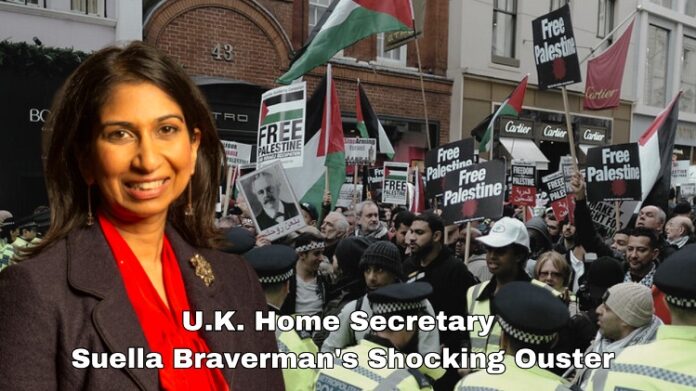| Translate This News In |
|---|
U.K. Prime Minister Rishi Sunak’s decision to dismiss Suella Braverman from her role as Home Secretary comes in the wake of a tumultuous weekend marked by marches and protests in London. Braverman, responsible for law enforcement in England and Wales, faced the repercussions of expressing her concerns in an op-ed for The Times of London on November 8. In this piece, she focused on the “pro-Palestine movement,” predicting that “hate marchers” would exploit Armistice Day, November 11, for a demonstration in London.
Armistice Day, also known as Remembrance Day, holds significance globally as a day to commemorate the armistice signed between the Allies of World War I and Germany. Braverman’s article raised issues surrounding the perceived bias of senior police officers in dealing with various protest groups, particularly during the COVID-19 pandemic. She questioned the differential treatment of lockdown objectors, Black Lives Matter demonstrators, right-wing protesters, and pro-Palestinian groups.
The weekend’s events unfolded with clashes between right-wing protesters, soccer hooligans, and the Metropolitan Police at the Cenotaph in London, the site where Remembrance Day is observed. This resulted in 120 arrests and injuries to several police personnel. A subsequent peace march witnessed instances of antisemitism, prompting calls from the opposition for Braverman’s resignation.
A day after these incidents, Braverman took to Twitter, praising the professionalism of the police but condemning the inflammatory and criminal behavior displayed during the protests. She expressed concern about the rising levels of hate, violence, and antisemitism in London, emphasizing the need for further action to address these issues.
On Monday, Braverman was removed from her position for the second time, with her previous dismissal occurring during Liz Truss’s brief tenure as prime minister. Sunak had reinstated her six days later when he assumed office. Braverman, upon her sacking, expressed gratitude for serving as Home Secretary and hinted at providing more insight in due course.
Simultaneously, a cabinet reshuffle is in progress, with Foreign Secretary James Cleverly appointed as Braverman’s successor and former Prime Minister David Cameron taking over as the new Foreign Secretary.
In the aftermath of Braverman’s dismissal, a notable rift emerged within the Conservative party, with differing opinions on the handling of the situation. Braverman’s critical remarks on the police’s approach to the pro-Palestinian march, her subsequent removal, and the reshuffling of key cabinet positions have fueled controversy. Some view her sacking as a mistake, arguing that she understood the sentiments of the British public, especially on issues related to protests and policing.
The events surrounding Braverman’s dismissal come amidst broader discussions on protest dynamics and policing strategies, with implications for community tensions. The Metropolitan Police emphasized the intensity of the debate on these matters, possibly alluding to Braverman’s criticisms of the force. The independence of British police from government influence was highlighted, and the opposition Labour Party accused Braverman of undermining her office by seemingly questioning the judgment of senior officers.
Allies of Braverman, including Conservative MP Andrea Jenkyns and former Cabinet minister Jacob Rees-Mogg, expressed support for her, framing her sacking as a consequence of speaking out. The debate within the Conservative party raises questions about the alignment of political leaders with the sentiments of the electorate, particularly in the context of upcoming elections.


















